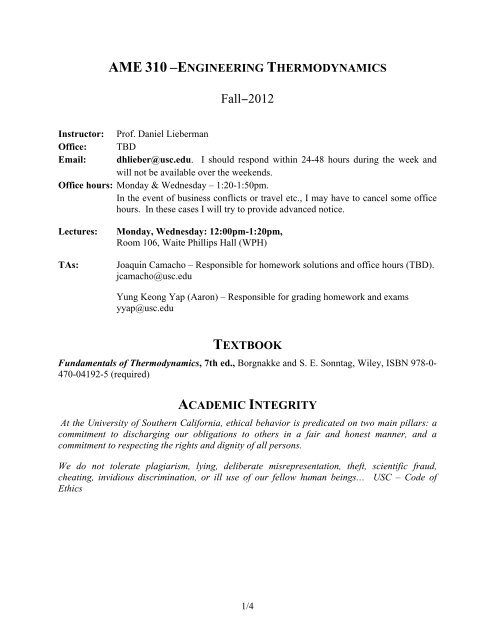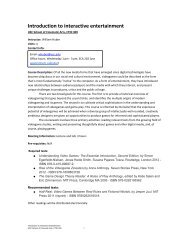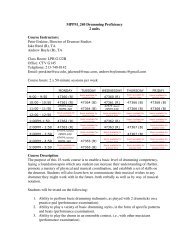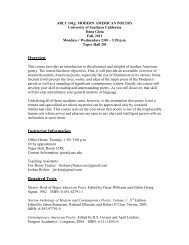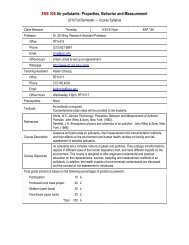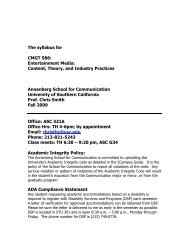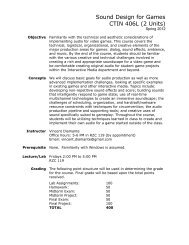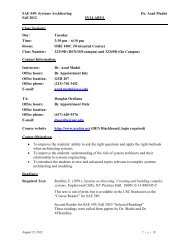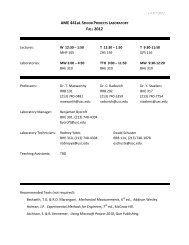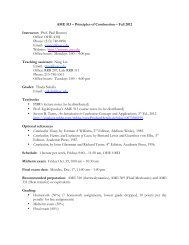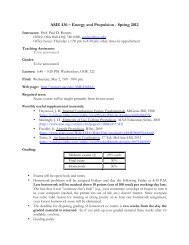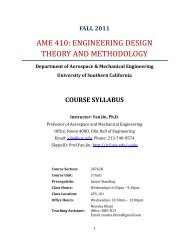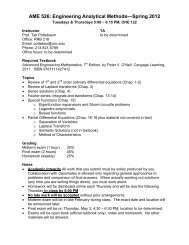AME 310 –E - USC Web Services - University of Southern California
AME 310 –E - USC Web Services - University of Southern California
AME 310 –E - USC Web Services - University of Southern California
You also want an ePaper? Increase the reach of your titles
YUMPU automatically turns print PDFs into web optimized ePapers that Google loves.
<strong>AME</strong> <strong>310</strong> –ENGINEERING THERMODYNAMICS<br />
Fall�2012<br />
Instructor: Pr<strong>of</strong>. Daniel Lieberman<br />
Office: TBD<br />
Email: dhlieber@usc.edu. I should respond within 24-48 hours during the week and<br />
will not be available over the weekends.<br />
Office hours: Monday & Wednesday – 1:20-1:50pm.<br />
In the event <strong>of</strong> business conflicts or travel etc., I may have to cancel some <strong>of</strong>fice<br />
hours. In these cases I will try to provide advanced notice.<br />
Lectures: Monday, Wednesday: 12:00pm-1:20pm,<br />
Room 106, Waite Phillips Hall (WPH)<br />
TAs: Joaquin Camacho – Responsible for homework solutions and <strong>of</strong>fice hours (TBD).<br />
jcamacho@usc.edu<br />
Yung Keong Yap (Aaron) – Responsible for grading homework and exams<br />
yyap@usc.edu<br />
TEXTBOOK<br />
Fundamentals <strong>of</strong> Thermodynamics, 7th ed., Borgnakke and S. E. Sonntag, Wiley, ISBN 978-0-<br />
470-04192-5 (required)<br />
ACADEMIC INTEGRITY<br />
At the <strong>University</strong> <strong>of</strong> <strong>Southern</strong> <strong>California</strong>, ethical behavior is predicated on two main pillars: a<br />
commitment to discharging our obligations to others in a fair and honest manner, and a<br />
commitment to respecting the rights and dignity <strong>of</strong> all persons.<br />
We do not tolerate plagiarism, lying, deliberate misrepresentation, theft, scientific fraud,<br />
cheating, invidious discrimination, or ill use <strong>of</strong> our fellow human beings… <strong>USC</strong> – Code <strong>of</strong><br />
Ethics<br />
1/4
COURSE DESCRIPTION<br />
This course covers the fundamentals <strong>of</strong> classical thermodynamics. Thermodynamics is the study<br />
<strong>of</strong> how energy and heat can be used to perform useful work. Applications <strong>of</strong> thermodynamic<br />
analyses will be introduced and include the operation <strong>of</strong> vehicles (aircraft, cars, etc.), power<br />
plants (coal, nuclear, steam, etc.), and other energy technologies.<br />
The Laws <strong>of</strong> Thermodynamics<br />
1. You can’t win, you can only break even.<br />
2. You can only break even at the absolute zero.<br />
3. You cannot reach absolute zero.<br />
Conclusion: You can neither win nor break even.<br />
Quoted by Dugdale on the last page <strong>of</strong> Entropy and its physical meaning.<br />
LEARNING OBJECTIVES<br />
You are expected to understand the following by the end <strong>of</strong> the course:<br />
Basic Concepts<br />
� The basic terminology <strong>of</strong> thermodynamics<br />
� How a thermodynamic state is specified<br />
� How to determine the properties <strong>of</strong> a thermodynamic system at any state<br />
First Law Concepts<br />
� How to determine the energy <strong>of</strong> a system<br />
� How energy is exchanged through “heat transfer” or “work”<br />
� How to perform an energy balance for a “closed” or “open” system<br />
Second Law Concepts<br />
� Why time has a certain direction<br />
� Why heat flows from hot to cold<br />
� Why perpetual motion machines are impossible<br />
Applications<br />
� How to systematically analyze engineering thermodynamic systems, such as pumps, engines,<br />
refrigerators, power plants, etc.<br />
� How to calculate the efficiency <strong>of</strong> such a system using concepts from the Second Law.<br />
2/4
GRADING SCHEME<br />
Percentage <strong>of</strong> Final Grade<br />
Homework Assignments 25%<br />
Midterm Exams 30% (15%/Ea.)<br />
Final Exam 45%<br />
• Exams will be closed book and notes<br />
• Half <strong>of</strong> the class lecture before each midterm will be devoted to review for the upcoming<br />
exam<br />
• Lowest score on a midterm or half <strong>of</strong> final exam will be given half weighting<br />
• No late homework will be accepted. However, the lowest score will be eliminated.<br />
• Solutions will be graded according to the quality and clarity <strong>of</strong> the work, not just based<br />
on the answer(s) provided.<br />
Collaboration Policy: I expect that everyone will try each problem on his or her own and that<br />
each solution is the result <strong>of</strong> that student’s individual effort. After working on a problem alone<br />
and having difficulty, you may discuss the homework with your classmates. However, do not<br />
copy someone else’s solutions or do the homework as a group effort. You are encouraged to go<br />
to the TAs if you get stuck but it is also acceptable to ask your classmates for guidance.<br />
HOMEWORK/EXAM SOLUTION REQUIREMENTS<br />
Clear presentation <strong>of</strong> ideas and methodology is essential to the analysis <strong>of</strong> engineering problems.<br />
By developing good solution practices to these homework assignments, you are training yourself<br />
to effectively communicate engineering solutions to your employers and customers.<br />
� Provide a problem statement at the beginning <strong>of</strong> the solution and include a diagram/sketch<br />
that helps to clearly define your system and variables.<br />
� State any assumptions needed to solve the problem and justify why your assumptions are<br />
good.<br />
� Express each step in a systematic and rigorous manner.<br />
� Express solutions using units appropriate and consistent with the problem statement.<br />
� Use the correct number <strong>of</strong> significant digits, typically 3.<br />
� Reference all data obtained from external sources including thermodynamic tables. Identify<br />
the book, page number, and table from which you obtained the information.<br />
� Check your work and make sure your answer makes sense. For example, if you find that it<br />
takes 9 GW to re-heat your cup <strong>of</strong> c<strong>of</strong>fee, you may want to check your arithmetic.<br />
3/4
Week Dates Topic<br />
TENTATIVE COURSE SCHEDULE<br />
4/4<br />
Textbook<br />
Chapters<br />
1 Aug 27 Basic concepts: temperature and pressure 1,2<br />
2 Sept. 3 § Ideal gas law and Mechanical energy 3,4<br />
3 Sept. 10 Heat and Work and the First Law 4<br />
4 Sept. 17 Thermodynamic properties <strong>of</strong> gases, liquids and solids 3<br />
5 Sept. 24 † Phase changes, equilibrium, and thermodynamic tables 3<br />
6 Oct. 1 First Law analysis <strong>of</strong> closed systems 5<br />
7 Oct 8 First Law analysis <strong>of</strong> open systems 6<br />
8 Oct. 15 The Second Law and perpetual motion machines 7<br />
9 Oct 22 Entropy, probability, and Second Law analysis 8<br />
10 Oct 29 † Gas power cycles (converting heat to work) & engines 12<br />
11 Nov. 5 Internal combustion engines (Otto and diesel cycles) 12<br />
12 Nov. 12 Open-system engines (gas turbines) 12<br />
13 Nov 19 Power And Refrigeration Systems – with phase change 11<br />
14 Nov. 26 Gas Mixtures 13<br />
15 Dec. 3 Chemical reactions 15<br />
16 Dec. 10 Final Exam Review<br />
17 Dec. 17 Final Exam<br />
MIDTERM EXAMINATION DATES<br />
† The midterm examinations for this course will be held during the regularly scheduled lecture on:<br />
Monday, September 24<br />
Monday, October 29<br />
OTHER DATES<br />
§ Monday, September 3 is Labor day and is a holiday


